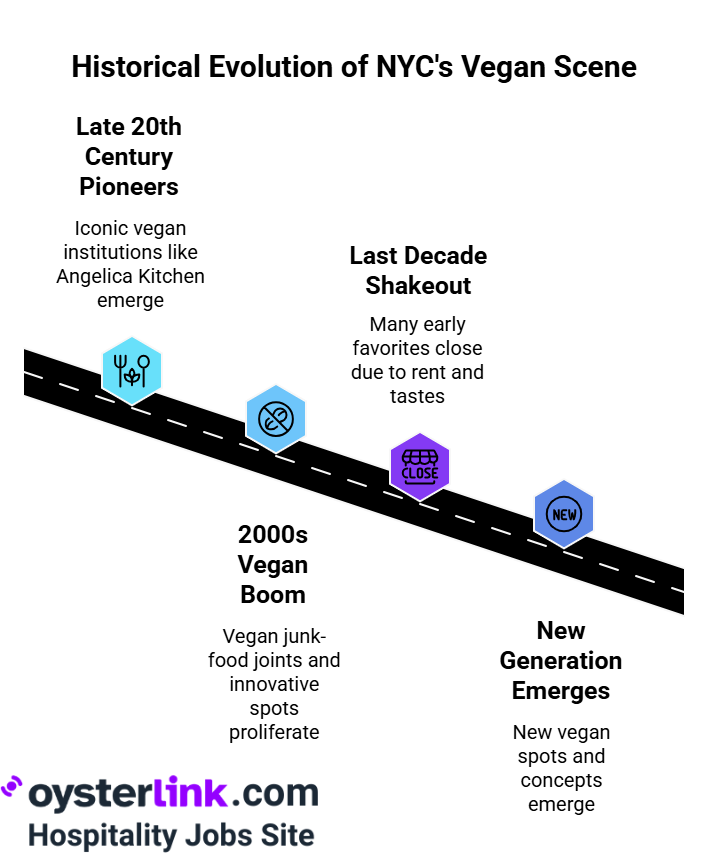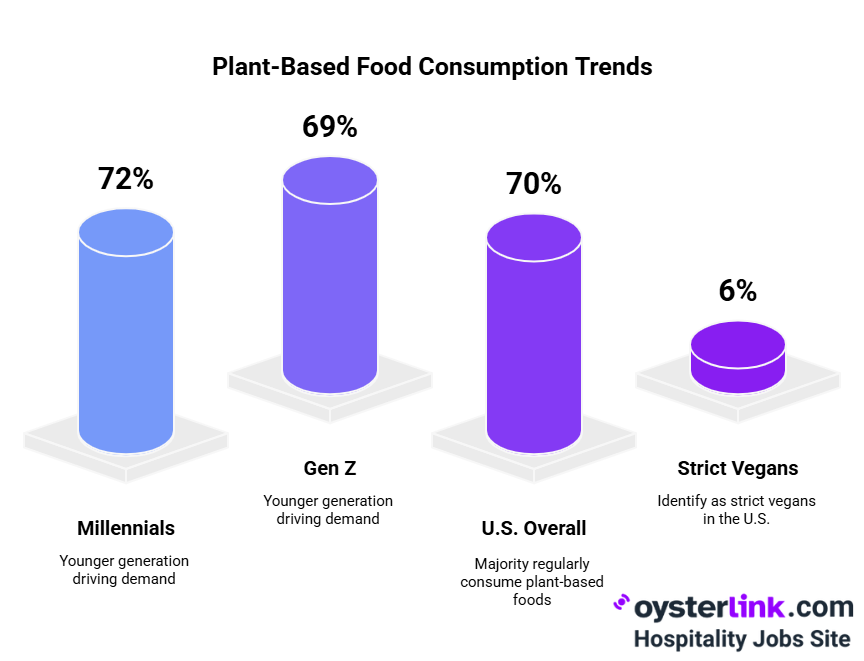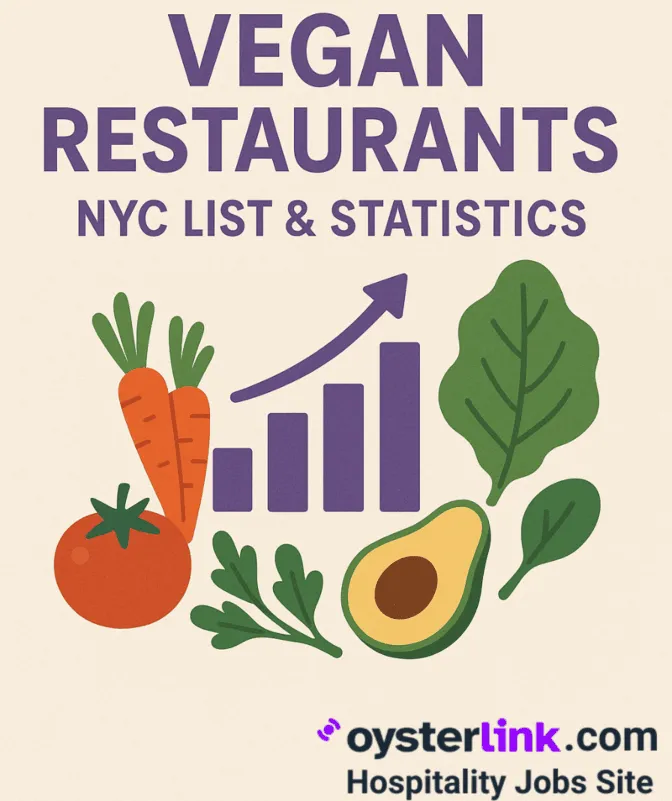Vegan Restaurants NYC Key Takeaways:
- NYC has 122 fully vegan restaurants and 1,165 with vegan menus.
- Manhattan and Brooklyn lead in vegan dining options.
- Vegan dining grew rapidly in the last decade despite closures.
- Younger generations are driving plant-based demand.
New York City’s plant-based dining scene has exploded in recent years, making the city a global leader for vegans. As of 2024, NYC is home to 122 fully vegan establishments (restaurants, cafes, bakeries, food trucks, etc.).
In addition, about 1,165 “vegan-friendly” venues – non-vegan restaurants and cafes that offer dedicated vegan menus – are scattered across the city.
For context, NYC’s entire restaurant industry numbered roughly 23,650 establishments in 2019, reflecting the city’s vast dining market.) In fact, a 2025 plant-based industry survey ranked NYC the top U.S. city for vegans, citing roughly 2,420 vegan/vegetarian/gluten-free eateries.
These figures underscore both the breadth of vegan options and the growing mainstream acceptance of plant-based dining in NYC. The table below shows how NYC’s ~17,600 listed restaurants (per Google Maps, 2025) are distributed across the boroughs – Manhattan alone holds over 6,400 (≈40% of the city’s total).
NYC Vegan restaurants and cafes follow a similar pattern, clustered mainly in Manhattan and Brooklyn, though every borough now boasts notable plant-based spots.
| Borough | Approx. Total Restaurants (2025) | Percentage of NYC Total |
|---|---|---|
| Manhattan | 6,418 | ~36% |
| Brooklyn | 4,845 | ~27% |
| Queens | 3,394 | ~19% |
| Bronx | 2,078 | ~12% |
| Staten Island | 884 | ~5% |
| Total | 17,619 | 100% |
NYC restaurants by borough (2025 OysterLink data) and their share of the city total.
Notable Vegan Restaurants in NYC
Below are some celebrated vegan restaurants NYC has to offer, showcasing the scene’s diversity and innovation:
- Eleven Madison Park (Manhattan) – A world-renowned fine-dining restaurant (3 Michelin stars) that went fully vegan in 2021. It remains one of the city’s most famous eateries, known for luxurious plant-based tasting menus and even a VIP garage entry for celebrity guests.
- Spicy Moon (Manhattan) – A trendy vegan Szechuan Chinese chain (East Village, Greenwich Village, Bowery). Its Bowery location is NYC’s largest vegan restaurant, and the menu features fiery mapo tofu, dan dan noodles, and other mala classics made 100% plant-based.
- SCEN (Lower Manhattan) – A fast-casual “Japandi” concept by chef Matthew Kenney. SCEN is billed as New York’s first truly zero-waste restaurant, serving organic, farm-to-table Asian-inspired bowls, sushi, smoothies and more.
- Ras Plant Based (Manhattan & Brooklyn) – A chic Ethiopian-inspired vegan restaurant. From tender vegan stews to colorful injera platters, Ras has won acclaim (and awards) for bringing upscale plant-based Ethiopian cuisine to NYC.
- Dirt Candy (East Village) – A longtime pioneer of high-end vegetable cooking. Chef Amanda Cohen’s flagship (open since 2008) helped make veggies sexy; its playful, inventive dishes have earned it national fame. (Cohen also opened the casual Lekka Burger in 2021.)
- VeganHood (Harlem) – Sister-led Caribbean-Soul food vegan spot in Harlem, known for hearty oxtail, mac-and-cheese, and community vibes.
- Bunna Café (Brooklyn) – An intimate Brooklyn restaurant offering traditional Ethiopian platters for communal dining. Bunna is celebrated for its authentic flavors, veganized coffee ceremony, and ethical ethos.
- Champs Diner (Brooklyn) – A retro-style 24-hour diner in Bushwick serving classic American comfort food all vegan: pancakes, burgers, hot dogs, and shakes. A beloved neighborhood institution since 2010.
- Confectionery! (East Village) – A vegan sweets shop famous for French-style pastries. Specialties include airy macarons, rainbow layer cakes and chocolates made with Lagusta’s Luscious vegan ganache.
- Whipped Urban Dessert Lab (Lower East Side) – A dessert lab known for its oatmilk soft-serve ice cream that went viral on social media. The simple menu (chocolate & vanilla) and creative toppings have made it a must-visit for vegans and non-vegans alike.
- Beyond Sushi (various locations) – A small chain of vegan sushi restaurants offering creative plant-based rolls (e.g. avocado maki, beet-cured “salmon” nigiri). It brought innovative vegan sushi to Manhattan’s food scene.
- Modern Love (Brooklyn) – Comfort-food spot by popular vegan cookbook author Isa Moskowitz (opened 2016). Serves indulgent plant-based diner classics (fried “chicken,” mac n’ cheese, tempeh cheesesteaks).
These examples show how NYC’s vegan dining ranges from late-night burger joints to gourmet bistros, from old-school comfort food to cutting-edge concepts. Many of these restaurants have won awards or rave reviews (for instance, many were listed in VegNews’ guide to NYC’s hottest vegan restaurants).
Celebrities and influencers frequently tout NYC vegan spots (for example, actor Alicia Silverstone has highlighted places like Van Leeuwen Ice Cream and upscale Hangawi on social media), further raising their profile.
Historical Evolution of NYC’s Vegan Scene
New York’s vegan dining has deep roots. In the late 20th century, iconic plant-based institutions began to appear. For example, Angelica Kitchen (East Village) opened in 1976, serving macrobiotic vegan fare until 2017. Caravan of Dreams (East Village) – an organic vegan restaurant – has been operating since 1991, making it one of the oldest in NYC.
In the 2000s, vegan junk-food joints and innovative concept spots proliferated: Foodswings (Williamsburg, opened 2003) offered buffalo tofu wings and seitan gyros, Pure Food and Wine (Greenwich Village, opened 2004) pioneered raw vegan cuisine, and Moby’s tea shop Teany (opened 2002) drew hip crowds.
However, the last decade saw a major shakeout. As plant-based eating went mainstream, rent pressures and changing tastes led many early favorites to close.
Prominent vegan stalwarts shuttered one after another: Kate’s Joint (East Village) closed in 2012; Foodswings in 2014; Pure Food and Wine and Teany in 2015; Lula’s Sweet Apothecary (vegan ice cream) in 2016; Angelica Kitchen in 2017; and high-end Candle 79 and Jivamuktea Café in 2019.

In early 2020 the famed Cinnamon Snail food truck (and Penn Station kiosk) also ceased operations. As one critic put it, “all the vegan restaurants that defined New York’s meatless dining scene had said goodbye” by 2019.
Despite these closures, a new generation of vegan spots has emerged. For example, long-running pioneers remain or have expanded – Amanda Cohen’s celebrated Dirt Candy (opened 2008) continues drawing crowds, and its casual spin-off Lekka Burger opened in 2021.
The iconic Champs Diner (Bushwick, opened 2010) and its late-night wing shop Hartbreakers (2018) exemplify nostalgic vegan comfort food. Other newer brands include plant-based dessert chains like Whipped Urban Dessert Lab, Van Leeuwen Ice Cream, and Dun-Well Doughnuts.
Notably, some high-profile chefs have launched vegan concepts: Chef Isabela “Isa” Chandra Moskowitz’s Modern Love (Brooklyn, 2016) and the global vegan restaurateur Matthew Kenney’s SCEN (NYC’s first zero-waste certified vegan eatery, opened 2022).
New York Vegan Restaurant Growth and Market Trends
Over the past decade, vegan dining in NYC has followed national trends of rapid growth. The number of vegan-friendly businesses (non-fully-vegan restaurants with dedicated vegan menus) grew by about 7% from 2023 to 2024, even as the count of exclusively vegan venues dipped slightly (–11% to 122) in that same period.
This suggests many mainstream restaurants are adding vegan options. NYC’s multicultural population and food-savvy diners mean plant-based menus now span every cuisine: vegan Chinese (Spicy Moon Szechuan), Italian (Coletta), Caribbean Soul Food (VeganHood), Ethiopian (Bunna Cafe), Mexican (Jajaja), classic American (e.g. Superiority Burger), French (Délice & Sarrasin), plus cakes, ice cream and more.
One guide notes NYC diners “could easily spend a week” trying everything from burgers and milkshakes to French macarons and Italian classics – “Ethiopian cuisine, and beyond”.

Younger generations in particular are driving demand. National surveys show ~72% of Millennials and ~69% of Gen Z respondents plan to eat more plant-based foods, far higher than older cohorts.
In the U.S. overall about 70% of people now regularly consume plant-based foods and roughly 6% identify as strict vegans. In NYC these trends are visible in diet and searches (New Yorkers Googled vegan terms at some of the highest rates nationwide).
The market response is robust: U.S. retail sales of plant-based foods jumped 66% from 2018 to 2022, and experts project continued growth in plant-based dining through 2030.
Economically, vegan restaurants are now a meaningful segment of NYC’s $74 billion tourism and hospitality economy. The city attracts over 62 million visitors (2023) – many of whom include dining out in their itinerary – and the food industry (23,650 NYC eateries in 2019) generates substantial jobs and tax revenue.
While no precise breakdown is available for vegan dining’s slice of that pie, the proliferation of high-profile vegan eateries, food tours, and plant-based festival events attests to its growing impact.
Even institutions are adapting: for example, NYC Health + Hospitals reported serving ~603,000 plant-based meals in 2023 through its default plant-friendly program.







Loading comments...